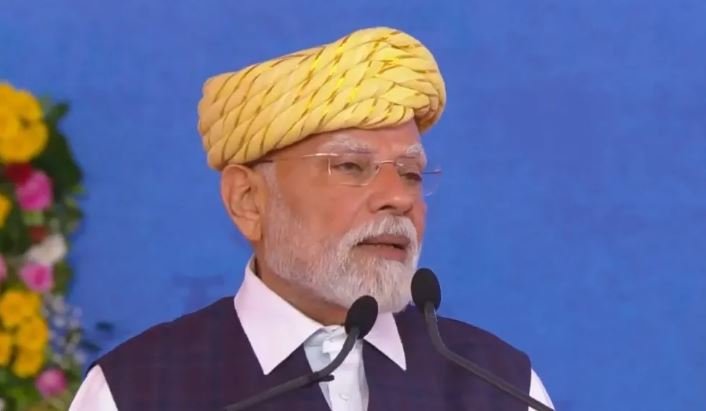PM Modi: India’s Biggest Enemy Is Dependence on Others, Self-Reliance Only Way Forward
‘One Nation, One Port, One Document’: PM Modi announces historic maritime reforms in Gujarat
Bhavnagar, Gujarat, Sept 20: Prime Minister Narendra Modi on Saturday called upon the nation to recognize its greatest challenge is not an external adversary but its dependence on other countries. Speaking at the Samudra se Samruddhi event, where he inaugurated and laid foundation stones for projects worth ₹34,200 crore, the prime minister underscored aatmanirbharta (self-reliance) as the only sustainable remedy to India’s long-standing vulnerabilities.
“India has no enemies in the world today in the traditional sense. But in reality, our biggest adversary is dependence on others,” he declared. Stressing that the nation’s future cannot be left to external forces, Modi warned that reliance on imports erodes national self-respect and compromises long-term growth. “The future of 140 crore Indians, and of generations to come, cannot rest on foreign shoulders,” he said.
The Prime Minister emphasized that self-reliance must span every sector—whether semiconductor chips or shipping vessels. Highlighting the decline of India’s shipbuilding industry, he noted that until five decades ago, Indian-built ships managed nearly 40 percent of the country’s trade, a figure that has now shrunk to just 5 percent. As a result, India spends nearly USD 75 billion (about ₹6 lakh crore) annually on freight payments to foreign shipping companies.
“Imagine the lakhs of crores that have left our shores in the last seven decades—money that could have created millions of jobs in India, strengthened our own industry, and given us global standing,” Modi remarked. He added that the government is determined to revive domestic shipbuilding, declaring, “Whether it is chips or ships, we must make them in India.”
The prime minister announced sweeping reforms in the maritime sector, positioning India as a rising global maritime power. From today, all major ports in the country will adopt the One Nation, One Document and One Nation, One Port process, eliminating redundant paperwork and simplifying trade procedures.
He revealed that five outdated colonial-era maritime laws had been overhauled during the recent Parliament session, paving the way for modern governance in shipping and ports. In a landmark decision, large ships have now been granted infrastructure status, enabling shipbuilders to access easier loans, lower interest rates, and the benefits of infrastructure financing.
Three major schemes, worth over ₹70,000 crore, are being rolled out to support the sector. These include financial assistance for shipyards, technology adoption programmes, and incentives to improve design and quality standards. Describing shipbuilding as the “mother of all industries,” Modi said it would catalyze growth across allied sectors, turning India’s vast coastlines into gateways of prosperity.
Targeting the Congress-led governments of earlier decades, Modi lamented the “license-quota raj” that stifled innovation and squandered India’s potential. “Young talent was suppressed, industries were shackled, and instead of building on our strengths, successive governments tied India’s future to imports. This neglect robbed us of opportunities and left us vulnerable,” he said. The prime minister also linked this dependency to a series of corruption scandals that flourished in the import-driven era of globalization.
Modi reiterated that self-reliance is not an isolationist agenda but a foundation for stronger global partnerships. “For peace, stability, and prosperity in the world, India—the most populous nation—must stand on its own feet. Dependency breeds weakness, but self-reliance builds strength and dignity,” he asserted.
At the event, Modi inaugurated and laid foundation stones for maritime projects worth ₹7,870 crore, as well as multiple state and central projects across Gujarat totaling ₹26,354 crore. Together, these initiatives reflect the government’s vision of blending infrastructure development with strategic self-reliance, ensuring India is prepared for the future.
“With our ports as the backbone, with ships built on our shores, and with chips designed and manufactured in India, we will script a new chapter of prosperity,” Modi said, concluding his address with a call for collective determination to defeat dependency.




